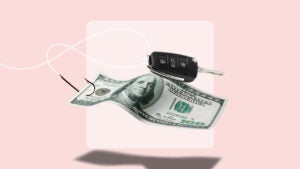7 ways to (legally!) get out of a car title loan




Key takeaways
- There are ways to get out of a car title loan, including paying off the loan in full, negotiating with the lender or refinancing with a lower-cost loan.
- Defaulting on a car title loan can have serious consequences, including repossession of your vehicle and damage to your credit score.
- It is important to carefully consider all options and budget carefully to avoid getting trapped in a cycle of debt with car title loans.
If you want to exit your car title loan, there are legal ways to do so. Not everyone has the funds to pay off a loan in full, but there are still ways to get out of debt faster. Finding a strategy that will work for your finances could save you hundreds, if not thousands, of dollars down the line and help you avoid a cycle of debt.
7 possible ways to get out of a title loan
When you want to get out of a title loan, you can negotiate with your current lender or take out a new, more affordable loan. You have other options if these aren’t possible, but they risk damaging your credit score.
1. Pay off the loan
Depending on your situation, paying off the car title loan might not be possible — but it does put the brakes on the borrowing cycle. First, contact the title loan lender and ask for the payoff amount. Ensure that you check for any fees or penalties associated with early payoff or loan satisfaction recording.
Next, decide where you can get the funds to repay the loan. Consider using these methods:
- Borrow money from friends or family.
- Tap into assets that have cash value, such as stocks, life insurance or retirement accounts. Be aware that retirement accounts have early withdrawal tax penalties. If possible, consider turning the withdrawal into a loan if you are confident you can repay it on time.
- Create a budget that helps you rein in spending and speed up debt repayment. Review all your bills and credit card accounts to assess what you can live without, and especially check automatic withdrawals to your bank account.
- Start a side gig to earn extra money.
- Ask for a salary advance from your employer.
- Sell a valuable item that you won’t miss.
Keep in mind: If you do receive an advance from your employer or tap into your savings, be sure to budget carefully. Ultimately, you want to avoid taking on expensive, short-term debt like title loans in the future.
2. Refinance with a personal loan
Another option is to apply for a new, lower-cost loan and use the funds to pay off the title loan. You can use a bad credit personal loan to refinance a title loan. Because they are unsecured, you won’t risk losing your car if you cannot repay them. However, you still risk being pursued by debt collectors if you fail to pay.
Qualifying for competitive personal loan interest rates can be hard with a low credit score. Even so, bad credit loan rates can be under 36 percent. The new loan should come with a lower fixed interest rate, lower monthly payments and more time to repay. As long as the loan comes with better terms, it will be less expensive than constantly rolling over your title loan.
Check with your bank or credit union to see what personal loans you qualify for, the rates and repayment periods.

Why you shouldn't roll over a title loan
“If you can’t pay back the loan when it’s due, it’s rolled over into another cycle with more fees,” says Bruce McClary, senior vice president of communications at the National Foundation for Credit Counseling. “It creates a very difficult situation for people who are already struggling to repay. It is the exact definition of the cycle of debt.”
Read on3. Renegotiate the loan terms
Your lender may be willing to negotiate if you can show financial need and your inability to repay the current terms. You may be able to negotiate a more affordable monthly payment. For instance, lengthening repayment terms can lower the payment amount, but be aware that cars depreciate in value. You don’t want to owe more than the car is worth.
When you negotiate, request a lower interest rate, lower monthly payment, longer loan term or a combination of the three. Ensure you can afford the new terms and get all the details in writing. Keeping your account in good standing on affordable terms will help you pay off the debt and keep your credit healthy.
4. Look into the Military Lending Act
The Military Lending Act is a measure that was adopted in 2006 and is designed to protect members of the military who are on active duty, as well as their spouses and dependents, from predatory lending practices. The MLA includes protections like capping interest rates on loans at 36 percent and prohibiting prepayment penalties on loans. The act and its protections apply to vehicle title loans.
If you feel a loan violates the MLA, try contacting your local Judge Advocate General’s (JAG) office as a first step. Your local JAG can provide more information about your rights. If you’re not sure how to locate the nearest JAG office, try using the JAG Legal Assistance Office locator.
5. Sell your car to avoid defaulting on a loan
If you have investigated all other options available and risk defaulting on the loan, consider selling your car and using the proceeds to repay the debt. This works best if you owe less on your car loan than the vehicle’s current market value. If you’re considering this option, first reach out to your lender to find out what the exact payoff amount is for the loan. As always, check to see if there prepayment penalties or other types of fees.
6. Consider debt settlement
If you can’t afford the whole payoff amount, your lender may be willing to accept a lower amount, especially if you’ve already missed several payments. This method is called debt settlement, and it can be done independently or with the help of a third-party debt settlement company. Once you agree to an amount, get the details in writing and ensure both parties sign the document, so the lender can’t demand more money later.
Keep in mind: When reviewing documents, remember to check for penalties if you fail to abide by their terms.
Negotiating debt does not come without risks:
- Your credit will take a hit. Although you’ve paid off the debt, it was for less than originally agreed upon. To avoid this, see if you can get the lender to report the loan as “paid in full” as part of your deal.
- The lender may report the account to the credit bureaus as “settled,” which will remain on your credit report for up to seven years.
- The process can take a long time, sometimes as long as three or four years.
- There are hefty fees — between 15 and 25 percent of the debt settled. If the fees are too large and the lender is not willing to negotiate, it may be best to look for a less costly alternative.
7. Declare Chapter 13 bankruptcy
You cannot discharge a secured debt in bankruptcy, but restructuring it through a Chapter 13 bankruptcy can result in a longer repayment period at a potentially reduced rate. With this type of filing, you create a repayment plan for all your debts, including your car title loan.
Throughout the repayment period, usually three to five years, you will make your payments to a court-appointed trustee. Keep in mind that bankruptcy also severely damages your credit and may remain on your report for up to seven years from the filing date. As a result, this option should be a last resort. If you decide to pursue this route, ensure that you find a qualified bankruptcy attorney.
Chapter 7 bankruptcy is designed for unsecured debts, such as personal loans and medical debt, so car title loans are generally not eligible. Despite this, many states allow you to protect your car and avoid vehicle repossession by leveraging bankruptcy code exemptions.
What happens if you don’t pay title loans?
There are various consequences if you fail to meet your payment obligations. The primary consequences you can expect are:
- Impact on your credit report: A lender will report missed payments to the credit bureaus and may eventually send your unpaid debt to collections. Derogatory marks won’t fall off your credit report for up to seven years and can negatively impact your credit scores.
- Repossession of your car: The lender may also repossess your vehicle to get you out of the car loan. Some lenders require borrowers to install a GPS device in the car when they take out the loan. That means if you default and try to hide the car, the lender can use the GPS to locate it — and may charge you an extra fee. That leaves you with even less money, damaged credit and no transportation.
In most states, lenders are required to notify you before repossessing your car. If you receive this notice, contact the lender immediately and try to negotiate with the lender or refinance the loan. Be aware that the repossession agent may not bother to make an appointment and may show up at any time and at any location to take your vehicle.
3 alternatives to car title loans
If you’re seeking options to get out of our title loan, you’re probably interested in avoiding another one. Here are some other options to consider should the situation arise again:
- Payday alternative loans: A payday alternative loan, usually offered by credit unions, allows you to borrow anywhere from $200 to $1,000 for up to six months.
- Credit card cash advances: A credit card cash advance is a short-term loan that is borrowed directly against the limit on your credit card, but this option tends to carry a higher interest rate than the typical credit card rate. Additionally, interest starts accruing immediately, rather than after a grace period.
- Paycheck advance: Some employers may be willing to provide you with an advance on your paycheck, which can be used to resolve your title loan debt. A paycheck or payroll advance is a short-term loan typically used to cover unforeseen expenses. Depending on the employer, you may be able to pay this type of loan back with deductions from upcoming paychecks.
Bottom line
A title loan may have been your only option when you borrowed, but that doesn’t mean you have to be stuck with it forever, thanks to these title loan loopholes and workarounds. Negotiating with your lender or searching for a bad credit personal loan may help you avoid fees, pay less in interest and prevent repossession. Just remember, until you get out of debt, always stay on top of your payments — even if it means making sacrifices in other areas of your budget.
Why we ask for feedback Your feedback helps us improve our content and services. It takes less than a minute to complete.
Your responses are anonymous and will only be used for improving our website.




